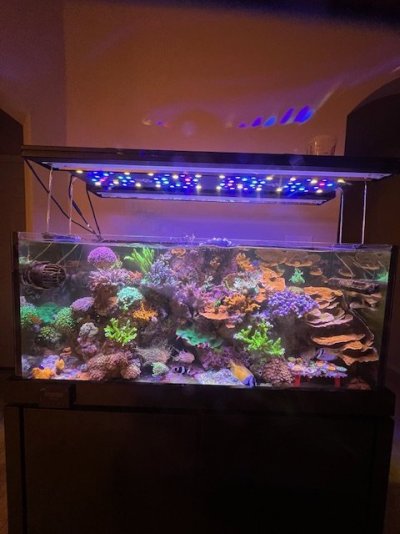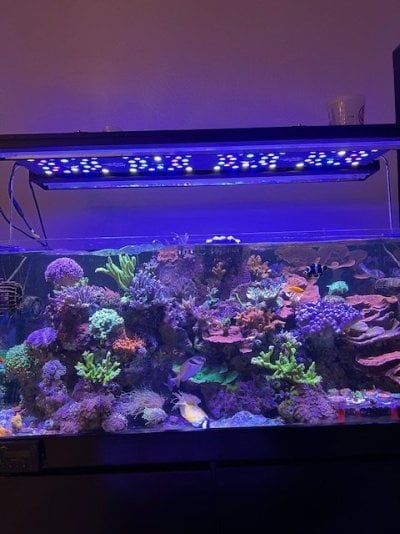Hey Everyone,
Logging my Total loss of my 90-gallon SPS dominant display from my move to a different state... Maybe as a lesson learned kind of deal.
We decided to move to a different state and made the move a few weeks ago, I've made a few tanks moves before but not with this much livestock.
Naturally I researched best ways to make the move, supplies needed, etc.. 3 100-watt heaters, portable bubbler and 3 25-gallon totes later, I disassembled my aquarium, corals in 3 bins, fish in other larger containers. Live rock was separated into multiple 5-gallon buckets.
My ultimate plan was to move all of my corals into a buddy's system that lives at the destination, and then setting up my new 8ft long tank, to then transfer my coral and fish after a good cycling.
The drive itself took about 14 hours, with me constantly checking up on the fish and corals to make sure everything was fine. It wasn't until towards the end of the trip, that I noticed the water starting to get murky and things not looking so good, temperature was fine, and bubbles still being made.
Once I arrived at the destination, basically everything was gone. Just bad smell from all of the containers.
Completely devasted from the total loss, took a little while to come to terms with it.
Overall, the lesson I learned from this move is to sell/rehome all of the livestock prior to moving.


Logging my Total loss of my 90-gallon SPS dominant display from my move to a different state... Maybe as a lesson learned kind of deal.
We decided to move to a different state and made the move a few weeks ago, I've made a few tanks moves before but not with this much livestock.
Naturally I researched best ways to make the move, supplies needed, etc.. 3 100-watt heaters, portable bubbler and 3 25-gallon totes later, I disassembled my aquarium, corals in 3 bins, fish in other larger containers. Live rock was separated into multiple 5-gallon buckets.
My ultimate plan was to move all of my corals into a buddy's system that lives at the destination, and then setting up my new 8ft long tank, to then transfer my coral and fish after a good cycling.
The drive itself took about 14 hours, with me constantly checking up on the fish and corals to make sure everything was fine. It wasn't until towards the end of the trip, that I noticed the water starting to get murky and things not looking so good, temperature was fine, and bubbles still being made.
Once I arrived at the destination, basically everything was gone. Just bad smell from all of the containers.
Completely devasted from the total loss, took a little while to come to terms with it.
Overall, the lesson I learned from this move is to sell/rehome all of the livestock prior to moving.

















